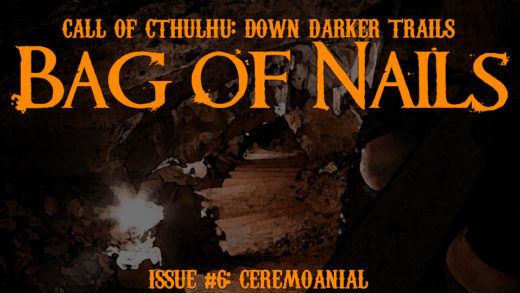The standard adage is that it’s the players’ responsibility to see the adventure hook and take it. This is not an unfair thought. I’d argue, however, that the introduction of why the characters would be there at all is the task of the scenario. The players have a responsibility to take the hook, but the GM has the obligation to ensure the hook makes sense for the characters. Sometimes the GM needs to lay out a map to say, “You Are Here… And Here’s Why.”
A number of classic and classic-style RPGs suggest (or sometimes dictate) that the player characters automatically work together as a group. This could be an unspoken background between adventurers who now work together (even the paladin and the assassin), a larger organization that ties a thread between all the characters (ala Pathfinder/Starfinder Societies or the D&D’s Adventurer’s Guild), or an employer that brings the characters together to work as a team. This was an easy way to ensure all the characters shared a single adventure hook.
Role-playing attitudes eventually changed towards focusing on individuality and personal agency of player characters. To compensate number of game systems favored placing each character in some sort of organization even if each character belonged to a separate organization (often with conflicting motivations). I’m thinking of things like Archangelic or Demonic Prince Words in In Nomine, alliances in Fading Suns, and clans in Legend of the Five Rings. With these systems a character might be an individual, but they belonged to a structure that could still demand a character get involved. Now the scenario only needed to focus on the hooks for each organization—and sometimes it came down to owing another a favor.
For at least half of my gaming experiences (as player or GM), characters were treated as individuals with unique motivations. Characters represented a diverse cast who may have some shared background between individuals but were under no obligation to work together. This often meant that the GM put together some sort of “why you should be a group” reason at the start of the campaign—often during the first adventure. As the initial mystery was resolved, the characters would now all have an established connection. However, for future scenarios at least a handful of adventure hooks based on the individual character would need to be thought of and provided.
I currently GM in two different campaigns that are only just getting started. While my “Unholy Preyer” campaign may be in “season two,” almost all the characters are new and that means re-starting the ties between the slowly-forming group. In both campaigns the characters not only have their own motivations, they often don’t share a single goal. As the campaigns are young all the scenarios I craft need to take into account the motivations of each character. Usually this can be done with a broad brush like thinking, “characters A, B, and C will want a reward; character D will do it for the good of the community; and Character E desires revenge.”
Sometimes, coming up with reasons for the characters to be part of a scenario takes me longer than writing the rest of the scenario. I rarely use pre-written modules but even those take a more generic approach toward character inclusion—which makes sense, the writers don’t know an individual group’s character. Motivations towards adventures do not have to be special showcases and there are some motivations that can be used continually. Standard tropes include:
- Financial reward – either through direct employment or the opportunity for gain in the scenario
- Revenge – this can sometimes mean there’s something in the scenario for the character to hurt their adversary or find a clue towards their goal
- Social obligation – some characters will feel the need to do good in general, but it could also mean fulfilling a favor owed another or helping a friend
- Knowledge or discovery – some characters are motivated to discover more be it growing scientifically/magically or investigating for the sake of a report (like the news)
- Guided by a higher power – this could be anything from hearing the voice (real or unreal) of a god or as simple as directed by a superior in the chain of command
As a GM and writer of the modules I run, I not only think of why the player characters should be involved but also why a host of NPCs wouldn’t be. In an upcoming “Bag of Nails” scenario I not only determined why most of the characters would want to be part of the adventure (or pressed into duty) but why the majority of the townsfolk would be exempted from the adventure so the spotlight could be on the player characters.
It’s an exercise and sometimes a difficult juggling act, but I think it adds depth and player investment when their character has an individual reason to be involved. Then, it’s just up to the players to take on the adventure. And that’s their responsibility.



Recent Comments